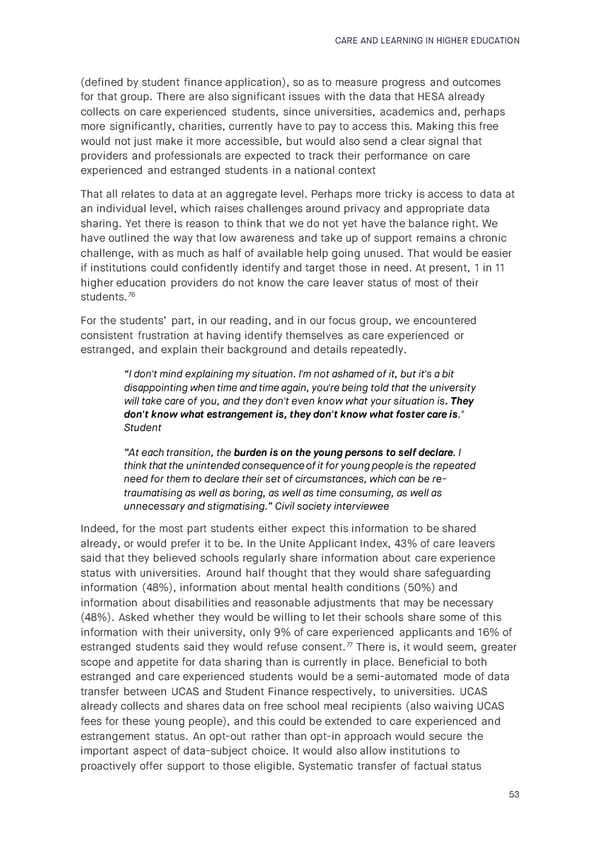CARE AND LEARNING IN HIGHER EDUCATION (defined by student finance application), so as to measure progress and outcomes for that group. There are also significant issues with the data that HESA already collects on care experienced students, since universities, academics and, perhaps more significantly, charities, currently have to pay to access this. Making this free would not just make it more accessible, but would also send a clear signal that providers and professionals are expected to track their performance on care experienced and estranged students in a national context That all relates to data at an aggregate level. Perhaps more tricky is access to data at an individual level, which raises challenges around privacy and appropriate data sharing. Yet there is reason to think that we do not yet have the balance right. We have outlined the way that low awareness and take up of support remains a chronic challenge, with as much as half of available help going unused. That would be easier if institutions could confidently identify and target those in need. At present, 1 in 11 higher education providers do not know the care leaver status of most of their students.76 For the students’ part, in our reading, and in our focus group, we encountered consistent frustration at having identify themselves as care experienced or estranged, and explain their background and details repeatedly. “I don't mind explaining my situation. I'm not ashamed of it, but it's a bit disappointing when time and time again, you're being told that the university will take care of you, and they don't even know what your situation is. They don't know what estrangement is, they don't know what foster care is." Student “At each transition, the burden is on the young persons to self declare. I think that the unintended consequence of it for young people is the repeated need for them to declare their set of circumstances, which can be re- traumatising as well as boring, as well as time consuming, as well as unnecessary and stigmatising.” Civil society interviewee Indeed, for the most part students either expect this information to be shared already, or would prefer it to be. In the Unite Applicant Index, 43% of care leavers said that they believed schools regularly share information about care experience status with universities. Around half thought that they would share safeguarding information (48%), information about mental health conditions (50%) and information about disabilities and reasonable adjustments that may be necessary (48%). Asked whether they would be willing to let their schools share some of this information with their university, only 9% of care experienced applicants and 16% of estranged students said they would refuse consent.77 There is, it would seem, greater scope and appetite for data sharing than is currently in place. Beneficial to both estranged and care experienced students would be a semi-automated mode of data transfer between UCAS and Student Finance respectively, to universities. UCAS already collects and shares data on free school meal recipients (also waiving UCAS fees for these young people), and this could be extended to care experienced and estrangement status. An opt-out rather than opt-in approach would secure the important aspect of data-subject choice. It would also allow institutions to proactively offer support to those eligible. Systematic transfer of factual status 53
 Care and Learning in Higher Education Page 53 Page 55
Care and Learning in Higher Education Page 53 Page 55